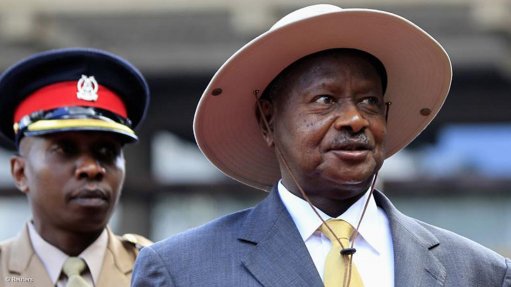
Yoweri Museveni
Photo by: Reuters
Incumbent Ugandan President, Yoweri Museveni, appears to be taking the lead following a preliminary tally of Thursday’s presidential and parliamentary election votes, released early Friday morning by Uganda’s Electoral Commission (EC).
However, these results refer largely to Uganda’s rural districts an EC source told Uganda’s Daily Monitor.
Provisional results in the capital Kampala put opposition leader Dr Kizza Besigye, from the Forum for Democratic Change (FDC), ahead.
“Museveni, 71, from the ruling National Resistance Movement’s (NRM) is leading with 63.7%,” reported the Daily Monitor.
“By midnight Mr Museveni had polled 117 298 votes from 580 polling stations, representing 2.07% of 28 010 polling wards in the whole country.
“The partial results have put the FDC candidate, Rtd. Col, Dr Kizza Besigye in the second slot, with 59 695 votes, representing 32.4% of total results received at the National Tally Center at Namboole Stadium.
“The Independent Go Forward candidate, John Patrick Amama Mbabazi is a distant third with 2 246 votes (1.2%), followed by Abed Bwanika of Peoples Development Party (PDP), who polled 1 723 votes (0.9%) and the only female candidate in the race, Ms Maureen Walube Kyalya is in fifth position with 1 141 votes (0.6%),” reported the Daily Monitor.
Museveni faces seven challengers, specifically Besigye, who has lost to Museveni in the last three elections.
The election’s provisional results follow the second arrest of Besigye this week.
The presidential candidate was again arrested on Thursday as he tried to enter a house he said was being used for “rigging national elections”, reported the Voice of America (VOA).
Besigye was also briefly arrested on Monday after his motorcade was blocked by police as he tried to address supporters at a central Kampala rally.
In addition to charges of vote-rigging, there were also complaints of polling stations opening late, shortages of ballot papers and the registration of thousands of ghost voters.
But the biggest complaint of all was the Ugandan authorities’ decision to block social media sites to “prevent lies being spread”.
“Facebook and Twitter are being blocked in Uganda as elections get under way this morning,” social activist and Kampala businessman, TMS Ruge tweeted Thursday morning.
“We are sure of the blockage. It started last night. This morning the Uganda Communications Commission (UCC) confirmed the blockage,” Ruge told ANA.
“For the tech savvy, there’s ways around it. It also depends where you are,” Ruge told the ANA, explaining how he was able to communicate with ANA via Twitter.
Ruge and other Ugandans made use of a Virtual Private Network (VPN), which redirects Internet usage to a computer outside of the country, to communicate.
Despite electoral setbacks the elections have not all been bad news.
One of the positive developments has been the unprecedented high turn-out with 15 million Ugandans registered to vote and a growing interest in the country’s politics.
“Voter participation has been at its highest, even among those too young to vote. They attended rallies,” Ruge told ANA.